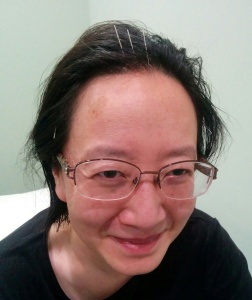I’m not religious, so I would normally not choose such a word. And I’m a scientist by training, so I’m generally suspicious of anything other people call miraculous. But given the circumstance, I have not a better word for what we witnessed yesterday.
Not able to walk by herself, nor to stand, nor to sit, nor to turn her head around, my wife got to Dr. Yali Li’s clinic with a set of Meniere’s symptoms: vertigo (not the worst this time, but more long lasting), headache, fullness of the ears, tinnitus. In other words, a complete package of misery.
She had the first, and the worst, vertigo about three weeks ago. We went to the emergency department of Stony Brook Hospital. She was given a bunch of medication, which we were told would be able to treat the symptoms. There is no treatment to the disease—she’s suspected to have Meniere’s.
In the following weeks we learned about Meniere’s Disease. Basically, if you’ve got this list of symptoms, and there is no known cause (such as a stroke), they would attribute (blame) it to the French physician Prosper Ménière. He’s the first one to group these symptoms together—something in the inner ear is messed up, causing all these symptoms. And soon enough, we got kind of confirmation: her head MRI scan came back normal, so were her Halter test measuring the heart.
Back at the clinic, the receptionist asked us to sit down. It’s hard for her to sit. There were not good chairs there, only a long bench that could easily sit ten. But there were only the two of us. She prefers her head to be horizontal—in the vertical orientation the head tunes in more closely to the attitude signals from the ears, signals which are of course completely misinformation in someone with Meniere’s. So she leans back, and her head banged against the wall—her eyes were shut and she didn’t guess the distance to the wall correctly. Then the single long cushion covering the bench started to slide down to the floor. I caught it in time.
She’s not under many drugs at that moment. From the various doctors, ER, primary care, ENT, we got about eight different drugs. The drugs all come with horrible side effects. Dizziness, light-headedness, low blood pressure (systolic, the high number, being lower than 90 at some point), tinkling hands, stomach discomfort, etc.
After filling out the forms for first time patient—I did it, as she, with her face skyward, and eyes shut, was in no shape to do it herself, a nice lady (Dr. Zheng) came over to ask us whether she could go to the office for a short interview, or would rather go to lie down in the treatment room directly. We chose the only option feasible. Shortly after, Dr. Li came in, together with Dr. Zheng. He has a large frame, but not over weight. His handshake is powerful—probably from the massages that are part of the traditional Chinese medicine. Yes, they can treat her, he assured us.
We heard of Dr. Li by way of my oncologist, Dr. Lan. It just happened that my regular appointment with him was on the day before, and I mentioned her condition. We gave a lot of weight to his recommendation, especially when most doctors tell us plainly there were no cure, and no good treatment. And the online literature says the same. The best hope we could get there is that often the symptoms would lessen, and with time they could completely disappear.
While the sign on the outside of the clinic indicates that he has a PhD and an MD, Dr. Li is trained partly in China, where the education necessarily includes western as well as Chinese medicine. But his practice specialty is Chinese medicine. And we can see why.
After about a minute, in which time he put some five acupuncture needles into her scalp, he asked my wife to sit up. She couldn’t believe she could do it herself, and asked for my help. She was not able to sit up, or stand up, when coming into the clinic. At home, to avoid making a couple of extra turns, she even chose to get into the back seat of my van instead of the passenger seat. But now, after sitting up, she kept her eyes open, and felt okay. She then came down the bed by herself, walked a few steps, and even moved her head around, up and down, left and right, under Dr. Li’s encouragement. She even stood unaided for several minutes!
A treatment of one minute! One minute! With no drugs! And no side effects!

In time, several more needles were inserted into her scalp. And her attitude sensation was steady. Now her main complaint is the sense of fullness in the ears and head, which apparently couldn’t be treated by acupuncture, or at least not at the moment.
Dr. Li told us that the illness can be cured in two to three treatments. That’s even more amazing. We were only looking for ways to relieve the symptoms without the terrible side effects. We were not even dreaming of a cure. And like a truly Chinese trained doctor, he claims that he is nothing special—any Chinese doctor could do the same.
We left in about an hour. She had ten needles left in her scalp, to be removed by me at home. One day later, she is worse than yesterday right after the treatment, but is still much better than before.
According to the NIH, there is no cure to Meniere’s. And acupuncture is not proven effective in treating the disease.